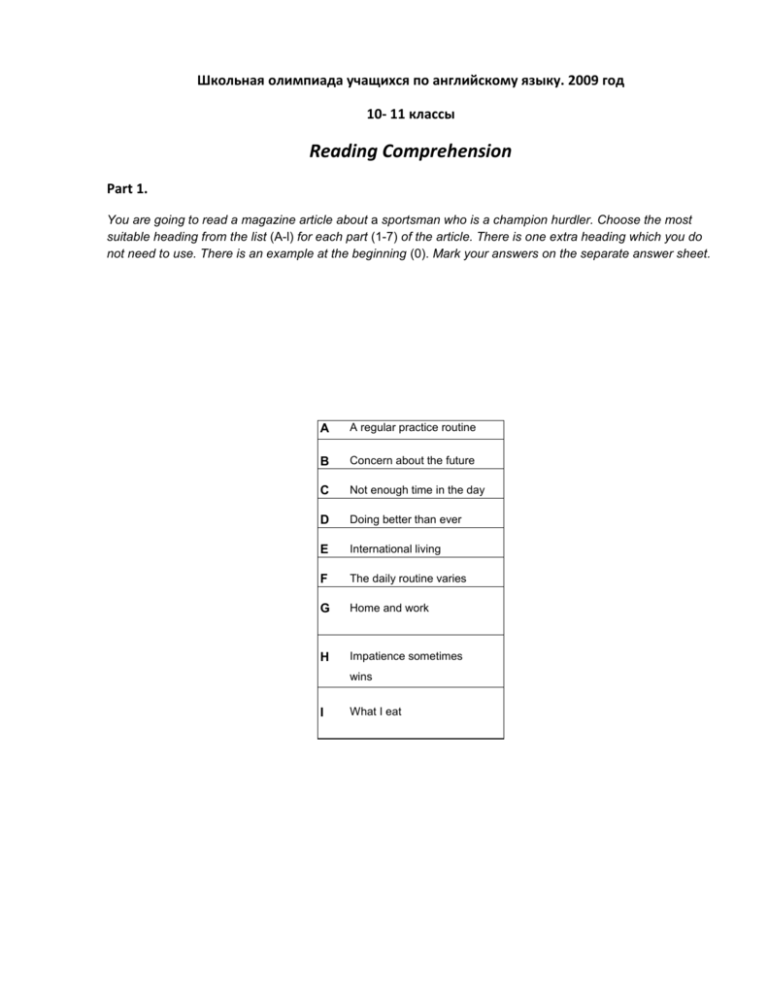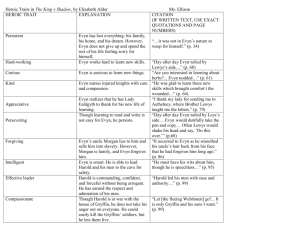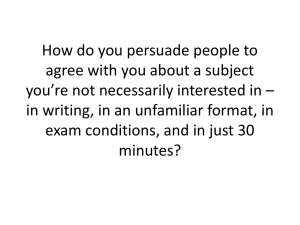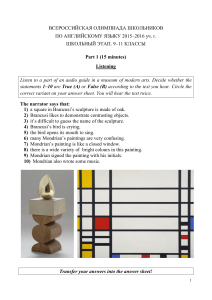Use of English
advertisement

Школьная олимпиада учащихся по английскому языку. 2009 год 10- 11 классы Reading Comprehension Part 1. You are going to read a magazine article about a sportsman who is a champion hurdler. Choose the most suitable heading from the list (A-l) for each part (1-7) of the article. There is one extra heading which you do not need to use. There is an example at the beginning (0). Mark your answers on the separate answer sheet. A A regular practice routine В Concern about the future С Not enough time in the day D Doing better than ever E International living F The daily routine varies G Home and work H Impatience sometimes wins I What I eat My Kind of Day 0 I Sometimes I don't eat for a couple of days - it's a personal thing that's developed over the past few years. It seems to me that people often eat out of habit, not because they're hungry. I'll often have low-fat yoghurt in the morning and sometimes turkey or pasta in the evening. 1 Home is a four-bedroom detached house in Rhoose in the Vale of Glamorgan, near Cardiff, where I was born. I also have a condominium in Toronto, a flat in Richmond, Surrey, where my sister Suzanne lives, and a house in Florida, which is where I train in the winter. My friend Mark McKoy, the Olympic 110 metres hurdles champion, encouraged me to get a place in Toronto and I love it there. It's where I'd like to end my days. 2 My father Ossie, a retired sales supervisor, and my mum Angela, a nurse, live with me in Rhoose but I have my own office where I work for Nuff Respect, the sports marketing and PR Company that I run with my friend Linford Christie. The name comes from a street expression that kids often say to us, meaning congratulations; our respect goes out to you. 3 I'm up about 8am and in training by 10am. Most days in the summer, I go to Cardiff Athletics Stadium with my hurdles partner Paul Gray. 1 usually drive into Cardiff in my Toyota Supra, pick up Paul and go to the track. We put the hurdles up - glamorous life, isn't it? - do an hour of stretching exercises and get into the hurdles work. 4 Hurdling is a natural thing -1 think you have to be born with it. You need to combine a runner's speed with a dancer's grace. Getting technically more efficient is the only way to keep improving and I'm in excellent shape at the moment. I'm confident I can break my 110 metres hurdles world record this summer - in Zurich on 17 August, in Brussels two days later or at the Commonwealth Games on 22 August. There could even be three new world records in a week. Then I'll be focusing on the next Olympics. 5 In the afternoon I do some work for Nuff Respect, using my computer and fax machine. I enjoy the work - after all, I'm the product being marketed - but I have a severe problem with unprofessional people. Usually I'm quite relaxed, but I'll shout at those who waste my time. 6 When the work's finished, I'll shower, change, ask my father what he's doing and maybe pick up Mum from University Hospital. Later, I may drop into Paul's house and cook for him and his family. I cook whatever's there - it's the only artistic thing I do. But I rarely eat it myself. 7 Back home, I'll watch late-night television until I feel tired. I always go to sleep thinking about what the next day holds. Sometimes it seems like a circus, a fantasy world. All I can do is run fast - is that a real kind of world? It certainly won't last forever. Part 2. You are going to read the beginning of a short story. For questions 8-14, choose the answer (А, В, С or D) which you think fits best according to the text. Mark your answers on the separate answer sheet. I lived with the Mother in a large white house surrounded by tall trees. It was a long walk to the nearest buildings as we were beyond the outskirts of town. It seems to me now that I would ask myself whether we needed to live as we did, she in this lonely white house leading her life, me elsewhere in that same large house, being me. Her child. I suppose in all those years I may have asked myself that, and yet I suspect, in reality, I scarcely gave it any thought. One day, soon after my thirtieth birthday, Mother told me that she had sold the house. She had found somewhere else, she said. She did not mention where. I did not ask. Shortly after, two very willing removal men arrived with an orange van which they promptly began loading up with furniture and boxes. Mother directed them from the house. I stood outside underneath our tall trees and watched, fascinated by the process. Many of the things which these strangers were steadily lifting up and taking away had never been moved before in all my lifetime. Indeed, until that moment, I don't think it ever occurred to me that these things could actually be moved. The house and everything in it had seemed so completely fixed. When I saw that the van was nearly full I went indoors to find Mother. 'Keep anything you like,' she said to me. 'I've taken all I want.' 'Thank you/1 said. The new people should be here tomorrow.' She climbed into the van alongside the two men, the engine started and they drove away. Next day, as Mother said they would, a couple came. They were obviously a bit annoyed to find me there. I packed some necessities into a small brown leather suitcase that I did not know was still in the house until I found it. I felt them watch me as I walked away down the path and along the road that eventually led to the railway station. It had been a long quiet walk so I was surprised when I found the station busy with activity. I had expected to sit for a while and calmly decide my next course of action but a quick glance round the station told me that queuing for a ticket was the first thing for all newcomers to do -buying a cup of tea and trying to find a seat on the platform the next. The queue was long and appeared to move forward only slowly. All well and good, I thought, taking my place behind a woman who was engaged in a fierce argument with her husband while trying to keep several children in order. 'Everyone!' he repeated sarcastically. The husband looked angrily around and as I stood up he caught my eye. I was now part of the argument against him. 'Yes, everyone - so you might just as well make up your mind to enjoy yourself, Harold/ T certainly will!' Harold spat back. 'And it won't be with you either!' he told his wife. It was all very public and rather shocking. 'Where to?' The family had reached the front of the queue. 'Two and three halves, returns to Southpool”, the woman declared. Harold was called upon to pay. This he did by counting out the money as slowly as it is possible to count out money. The queue heaved impatiently. 'Where to?' 'Southpool’, I said without a moment's hesitation. 'One way, or are you coming back?' he asked. 'One way/1 said. I was almost surprised when he handed me the ticket. When I had paid, I had half an hour to wait and enough money for a cup of tea. During that half hour, I reckoned it like this: All these people going to the seaside would be eating teas in little cafes along the sea front. Other people would be employed to serve those teas. The train was packed. 1 was lucky and managed to squeeze myself on to a seat. I did not see Harold and his family again. 8 When the author was a child, how did she feel about her mother's coldness? A В С D She wished her mother were different. She didn't let it bother her. She tried to change their lives. She wondered if she was really her mother. 9 What does 'it' in line 11 refer to? A В С D the way she treated her mother the town the way they lived the house 10 How did the author feel when she watched their things going into the van? A В С D surprised at how easily their home was taken apart worried about what was going to happen glad her mother was going concerned that the men should do their job properly 11 The author was still in the house when the new people came because she A В С D didn't want to go with her mother. hadn't arranged to leave until the day after her mother. hadn't made any plans. didn't want to leave the house. 12 Why did she buy a ticket as soon as she got to the station? A В С D because there was nowhere to sit down because she was in a hurry to catch her train because that was what everyone else was doing because she wanted to get away from the crowd 13 Why did she disapprove of the family? A В С D because they did not have much money because the children were badly behaved because they did not speak to her because they were arguing in front of other people 14 Why did she feel she had chosen the right place to go? A because she hadn't been to Southpool before В because she thought she could get a job in Southpool С because she was looking forward to having tea by the sea D because she couldn't afford to go further Use of English Part 1. For questions 1-15, read the text below and decide which answer А, В, С or D best fits each space. There is an example at the beginning (0). Mark your answers on the separate answer sheet. 0 A ever B then C also D yet LOOK ON THE BRIGHT SIDE Do you (0).... wish you were more optimistic, someone who always (1).... to be successful? Having someone around who always (2).... the worst isn't really a lot of (3).... we all know someone who sees a single cloud on a sunny day and says, 'It looks (4).... rain.' But if you catch yourself thinking such things, it's important to do something (5).... it. You can change your view of life, (6).... to psychologists. It only takes a little effort, and you'll find life more rewarding as a (7).....Optimism, they say, is partly about self-respect and confidence but it's also a more positive way of looking at life and all it has to (8).....Optimists are more (9) .... to start new projects and are generally more prepared to take risks. Upbringing is obviously very important informing your (10).... to the world. Some people are brought up to (11).... too much on others and grow up forever blaming other people when anything (12) .... wrong. Most optimists, on the (13) .... hand, have been brought up not to (14) .... failure as the end of the world - they just (15).... with their lives. В expected С felt D waited 2 A worries В cares С fears D doubts 3 A amusement В play С enjoyment D fun 4 A so В to С for D like 5 В against С about D over 6 A judging В according С concerning D following 7 A result В reason С purpose D product 8 A supply В suggest С offer D propose 9 A possible В likely С hopeful D welcome Ю A opinion В attitude С view D position 11 В believe С depend D hope 12 A goes В falls С comes D turns 13 A opposite В next С other D far 1 A counted A with A trust 14 A regard В respect С suppose D think 15 A get up В get on С get out D get over Part 2. For questions 16-30, read the text below and think of the word which best fits each space, Use only one word in each space. There is an example at the beginning (0). Write your word on the separate answer sheet. 0 their A BUSY FAMILY In the front room of (0).... home, the Henry family gathered around their TV set (16) .... a popular soap opera began. 'Look, there's Mum!' shouted 11-year-old Kathy, pointing (17).... the screen. 'She's sitting at that table (18).... the corner.' Sure enough, there was Julia Henry, enjoying a relaxed drink in (19) .... of the country's most famous TV programmes. Julia's family see (20) .... unusual in her job (21) .... a 'bit-part' actor, or 'extra', because they are all doing it. Her husband, Tony, (22).... been in several drama series as (23).... as numerous adverts, while Kathy and her 13-year-old brother, Robin, have also appeared (24).... TV countless times. It all started four years (25) .... when Tony, an amateur actor from Lancashire, decided to leave his job and take (26).... acting professionally. At the age of 41, it was a big step to take, but he has (27).... regrets about it at all. Soon the whole family were being offered chances to play small parts just like him, though Tony admits there are times when he wishes he (28).... a star. 'We really enjoy our lives,' says Tony, 'although it is difficult to (29).... plans. A couple of phone calls can turn our week upside down, but we love (30).... minute of it!' Part 3. For questions 31-45, read the text below and look carefully at each line. Some of the lines are correct, and some have a word which should not be there. If a line is correct, put a tick by the number on the separate answer sheet If a line has a word which should not be there, write the word on the separate answer sheet. There are two examples at the beginning (0 and 00). 0 00 0 00 31 32 33 34 35 36 with A DIFFERENCE OF OPINION A musician friend of mine once went on an English course during his summer holidays. What he really wanted to do was to improve with his ability to think and react quickly and correctly in the spoken English. He said speaking in a foreign language always made him nervous, even if after three years of study. It turned out so that one of the teachers on the course had very strong views on music, and was not afraid to express them in the lessons. He claimed that music it was a drug, just like alcohol or cigarettes, and people who could not live through their lives without it 37 38 39 40 41 42 43 44 45 were to be pitied. Whatever was the subject of the lesson, the teacher always managed to include in some reference to this idea. You can imagine that my friend was not very impressed. In the end, he lost his temper, and spent most of the remaining lessons for arguing about music and its role in people's lives. When his course had finished, he came home still being angry about the experience. However, whether he has enjoyed the course or not, my friend had to admit that the teacher's technique had worked ever since his nervousness in English had completely disappeared and he was speaking far more fluently than before. Part 4. For questions 46-55, read the text below. Use the word given in capitals at the end of each line to form a word that fits in the space in the same line. There is an example at the beginning (0). Write your word on the separate answer sheet. THE HISTORY OF TOYS 0 existence When did the first toys come into (0) .... and what led to their EXIST (46) .... ? Did they represent an attempt by adults to make children DEVELOP happy, or did they arise from the various playful (47) .... of children ACTIVE themselves? As everyone knows, the young (48) .... copy the (49) .... of their elders, and, in their play, they often adopt objects used by adults for entirely different purposes. These objects (50).... the child's (51).... and lead to games in which everyday articles often FREQUENT BEHAVE COURAGE IMAGINE play unusual and (52).... roles. EXPECT It is rather surprising that for an (53) .... of the origin of toys, we EXPLAIN cannot turn to folk stories. However, no traditional tale (54).... to the origin of toys exists, and so our (55).... is restricted to archaeological study and limited evidence from documents. RELATE KNOW Action Device Reading 1 2 3 4 5 6 7 8 9 10 11 12 13 14 Use of English 1 2 3 4 5 6 7 8 9 10 11 12 13 14 15 16 17 18 19 20 21 22 23 24 25 26 27 28 29 30 31 32 33 34 35 36 37 38 39 40 41 42 43 44 45 46 47 48 49 50 51 52 53 54 55 Ответы Школьная олимпиада учащихся по английскому языку. 2009 год 10- 11 классы Keys Reading 1 2 3 4 5 6 7 8 9 10 11 12 13 14 E G A D H F B B C A C C D B Total score: 69 Use of English 1 2 3 4 5 6 7 8 9 10 11 12 13 14 15 16 17 18 19 20 B C D D C B A C B B C A C A B As/when At/to/towards In One Nothing/little 21 22 23 24 25 26 27 28 29 30 31 32 33 34 35 36 37 38 39 40 As Has Well On Ago Up No Were/was Make/form Every The If So It Through Was In for 41 42 43 44 45 46 47 48 49 50 51 52 53 54 55 Being Has Ever Development Activities Frequently Behaviour Encourage Imagination Unexpected Explanation Relating/related Knowledge











